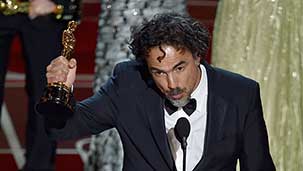Dear TIFF,
So you lost another potential feather in your cap. Big deal, right?
Actually, yes, it is.
For several years now, the Toronto International Film Festival’s identity has been built around launching “important Oscar films” to the world. It started around 1999, when American Beauty claimed top prize at both the Oscars and TIFF. The next year, Crouching Tiger, Hidden Dragon was the people’s choice winner and a Best Picture nominee. This hot streak went cool until 2008’s Slumdog Millionaire. That’s when things got serious.
Danny Boyle himself credited the TIFF award with saving Slumdog from a straight-to-DVD release, and unfortunately (if not understandably) the praise went straight to your head.
Every year you position yourself as the ideal launching pad for films that hit the sweet-spot between critical and popular appeal. And you aren’t wrong. Every TIFF People’s Choice award winner since Slumdog has either been nominated or won the Best Picture Oscar (save 2011’s out-of-nowhere and never-heard-from-again Where Do We Go Now?). But it’s getting harder and harder to claim any pride in those victories—especially when films like The King’s Speech and 12 Years a Slave played to most of America’s top critics in Telluride before you were able to debut them.
This year seems to be proving the point. Your 2014 winner, The Imitation Game, lived up to the promise with a Best Picture nomination, but just couldn’t gather enough steam to be a break-out hit (with either critics or the public). Instead, Birdman swooped in and took Oscar’s top prize. Or, as you probably remember it, the film that everyone at TIFF lamented they couldn’t see because it had opened the Venice Film Festival.
And that’s the problem. Critics, studio reps, and sales agents can only earmark so many festivals each year. Without the prestige of Cannes, bustling market of Berlin, caché of Venice, or discovery-factor of Sundance, you have always struggled to find a true identity. So you’ve opted for size and spectacle, becoming “the people’s festival” where the city’s diverse population stands in for the tastes of the world. But in that big, generic label, you’re getting lost in the shuffle—especially when so many other festivals are doing a better job of launching big films into the marketplace.
Sundance has been the biggest success story of the past few years by developing both breakout directors and seasoned visionaries through films like Beasts of the Southern Wild, Whiplash, and Boyhood. The Sundance Labs are also proving to be breading ground of talent, where producers can get an early peek at rising stars. Venice and Telluride are also a more appealing film going experience for critics, curating manageable schedules which prominently feature each of the 20-odd titles (as opposed to the hundreds that play at TIFF). And then Cannes. Well...it’s Cannes. Even after holding a whole months-long exhibit dedicated solely to the work of David Cronenberg, Toronto’s prodigal son took his latest film Maps to the Stars to La Croisette for its premiere instead.
Can you blame him, though?
More than ever, festivals matter. This year, every film nominated for Best Picture premiered at a film festival (compared to 60-80% in the past five years). The battle lines are no longer just drawn between studios, but savvy programmers from Cannes, New York, Venice, Sundance, and Telluride. The days when a film could sneak overseas and surprise audiences in North America are over. Online reviews make a film’s reputation, and, for better or worse, it’s virtually set in stone after the first premiere (even if it’s hidden from the public in the high altitudes of Colorado or canals of Venice). You know this all too well, which is why your artistic director, Cameron Bailey, implemented the controversial first weekend rule of TIFF, creating a two-tier status between Toronto world premieres and first-time Toronto screenings.
Now you might have to take things even further.
It’s going to be hard to argue that playing hardball has paid off in the first year, but you’re going to need to do something more than just pack theatres to make a splash in the film world. With the New York Film Festival taking more and more titles every year, Tribeca finding a groove, SXSW becoming a hub of innovation, and a slew of other festivals carving out niches, the “people’s festival” needs to do more than play the imitation game with Oscar winners if it wants to remain important.
Sincerely,

Christopher







